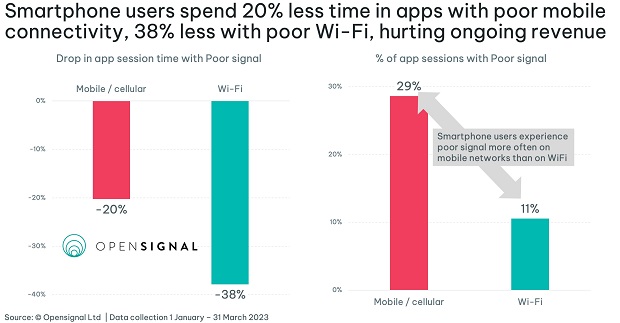Data and market analysis company Opensignal said mobile app publishers need to drive ongoing usage of smartphone apps to generate recurring revenues from advertising, in-app purchases and paid subscriptions.

However, Opensignal’s latest analysis demonstrates that when there is poor connectivity, users spend much less time in apps as they become dissatisfied with the experience and are less likely to retain apps on their device.
With poor mobile connectivity, users spend 20% less time in each app session while with poor Wi-Fi it’s an even greater 38% less time. After seven days, app retention rates are 49% lower for users that have seen consistently poor connectivity.
The company said poor connectivity is commonplace and data demonstrates that in 29% of mobile app sessions users experienced a poor signal. With Wi-Fi, 11% of app sessions had a poor signal.
Poor connectivity directly affects app revenues as well as increasing user dissatisfaction. Almost all apps are monetized either through in-app purchases or advertising. Both business models require people to continue using the app.
Data.ai (formerly App Annie) reports 2022 total global app revenues were $336 billion for advertising and $167 billion for app store spend, of which almost all was either in-app purchases or paid subscriptions.
Smartphone users have a poor cellular signal during 29% of app sessions — almost one-third. During these times, app sessions with active data transfers are 20% shorter, meaning fewer adverts will be shown to users, hurting app revenues.
Additionally, if users spend less time in apps they are more likely to cancel ongoing paid subscriptions or uninstall an app. On Wi-Fi, there is an even greater drop in app session length of 38% during the 11% of the time with a poor Wi-Fi signal.
With new extended reality (XR) and augmented reality offerings imminent — most likely from Apple and Meta — that need fast low latency connections to connect to cloud services, good quality connectivity is becoming even more important, on Wi-Fi as well as with mobile.
Qualcomm is also powering ahead with Snapdragon Spaces that combines relatively lightweight XR glasses with a tethered smartphone which provides both compute power and cellular connectivity while keeping the weight of the glasses to a minimum. Hardware partners include Xiaomi, OnePlus and Lenovo while telecom partners include China Mobile, Deutsche Telekom, KDDI, NTT Qonoq, Telefonica, T-Mobile, and Vodafone.
Users are most likely to uninstall apps on the first day after download. Approximately half of Android apps were uninstalled within 30 days of download, and nearly half of those were uninstalled inside the first 24 hours, according to AppsFlyer.
Opensignal data indicates even higher day one app uninstall rates when smartphone users face poor network connectivity. There are significant increases across different app categories, with Video Players apps being uninstalled 31% more when there’s a poor signal on the first day, followed by News & Magazines 24% and Lifestyle 23% more often.




